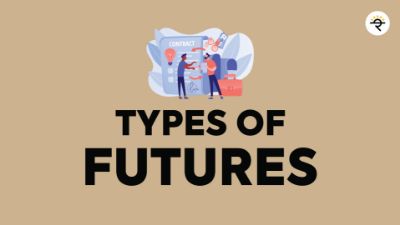Till now we have learnt about what are derivatives, what are the types of derivatives and what are futures. Let’s revise it quickly. A derivative instrument is a contract between a buyer and a seller based on their views about an underlying assets’ future price movement. An underlying asset can be any financial instrument like stocks, bonds, commodities, currencies, interest rates and even indices. After that, we understood various types of derivatives like- Forwards, Swaps, Futures and Options. Then we took it up a notch with understanding Futures. But, as usual, ye dil mange more! That hunger for knowledge in us has not been fulfilled yet. So, in today’s blog, we will be discussing various types of futures. Let’s begin!

1. Commodity Futures
A commodity is anything that holds commercial value. In India, the various types of commodities being traded are Bullion, Agri, Energy, Base Metals. Commodity futures are contracts that derive their value from a commodity, bought and sold at a predetermined price in future. These contracts are usually preferred by producers or buyers to hedge against future price volatility. Some commodities like gold act as a hedge against inflation due to their low correlation with the stock market. In India, commodity futures are traded on Multi Commodity Exchange (MCX) and the National Commodity and Derivatives Exchange (NCDEX).
2. Currency Futures
As the name suggests, currency futures derive their value from the spot rate of a currency pair. A currency pair indicates the price of one currency that can be exchanged for another currency. These contracts allow you to buy or sell a currency at a fixed exchange rate at a future date. These futures are usually used to hedge against currency risk. For example, an importer importing raw materials from US may purchase USDINR futures to safeguard against rupee depreciation in future. In India, currency futures can be traded on NSE, BSE and MCX SX.
3. Interest Rate Futures
These are futures contracts based on interest-bearing debt instruments. The underlying debt instruments can be T-bills, Government bonds, etc. Interest rate futures is a contract between a buyer and a seller for the future delivery of a debt instrument at a predetermined price. These futures are usually used to hedge against interest rate risk. Due to the inverse relationship between interest rate and bond prices, the interest rate futures are also inversely related to the interest rates. In India, NSE and BSE offer interest rate futures
4. Stock Futures
This is where the real game starts! Stock future is a contract with an individual stock as an underlying. It is a contract to buy or sell a stock at a predetermined price and quantity at a future date. Usually, stock futures are used for speculation and/or hedging purposes. You may trade in stock futures on BSE and NSE. However, they are available only for a specified list of stocks that fulfil certain criteria as stated by the exchanges.
5. Index Futures
Now, what if you don’t want to trade in individual stock futures? No worries! We have Index futures as well. These futures will be contracts based on market indices like Nifty, Sensex, Bank Nifty etc. Traders use these contracts to speculate based on their directional views about the market. Many traders prefer index futures over stock futures, as the underlying index is a basket of stocks the risk is spread out amongst them. You may trade in index futures on BSE and NSClosing thoughts
I hope now you have a basic introduction to various types of futures. Generally, speculators and hedgers are the participants in these markets. Yes, the profit potential in these instruments is substantial but so is the risk of losses. There are many other things that you need to know about Futures before you take your first trade and as usual, I have got you covered. If you want to learn about Futures and Options in the most fun, simplified and practical manner, check out my detailed course on Futures & Options here. I am sure you will love it. Until next time!


